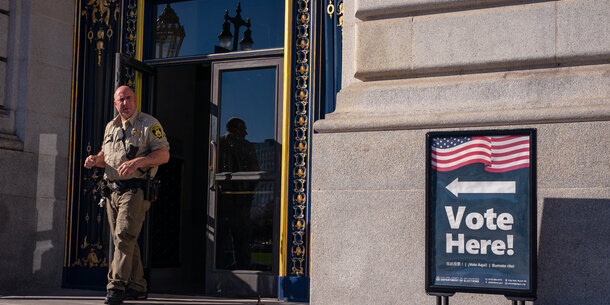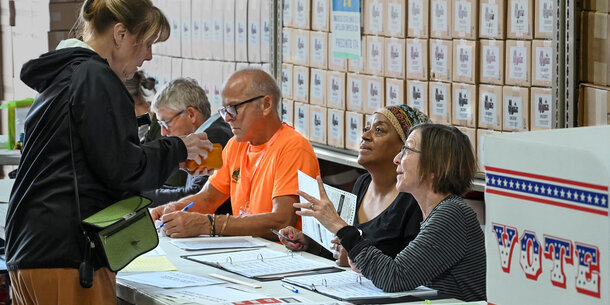Members of Congress are currently discussing whether to provide funding to protect U.S. election systems and election officials against attack. In case they’re wavering, it’s worth remembering why we embarked upon this project in the first place.
In 2016, Russian hackers targeted election systems in all 50 states. No votes were actually changed, but the hackers penetrated at least Illinois’s database deeply enough to have the ability to delete or change voter data. Few election officials even noticed the digital incursions.
It couldn’t have been a particularly difficult mission for Russia’s army of hackers: Many U.S. voting machines were more than a decade old. Some were so outdated that officials had to buy spare parts on eBay. A few were running Windows 2000. (Kids, ask your parents.)
The author and commentator Sarah Vowell observed that “the noun ‘infrastructure’ never appears in an American newspaper anymore without being preceded by the adjective ‘crumbling.’” Our election infrastructure was crumbling, and 2016 exposed its creaky girders.
After lobbying from state election officials and advocacy groups (including the Brennan Center), Congress devoted $380 million to upgrades in 2018 and added an additional $400 million in 2020. That money was critical. It helped deter new attacks on election infrastructure, and it allowed our election systems to stand up to the withering — albeit cosmically wrongheaded — scrutiny of election deniers.
The most visible change was the rapid transition away from paperless voting systems, allowing 93 percent of voters to use paper ballots in the 2020 election. Voting on paper allows people to verify that their ballot accurately reflects their choices and enables election workers to confirm the accuracy of the machine count by checking it against the physical ballots.
The importance of this switch is difficult to overstate. The hand recount of the 2020 election results in Georgia, for example, would have been impossible with the paperless voting machines that predominated just two years earlier. Paper ballots will also provide a critical reality check if there is any suspicion of hacking in future elections.
But the work is far from done. Too many Americans continue to vote on outdated, paperless voting machines, including everyone in Louisiana, more than half of Indianans, approximately 40 percent of citizens in New Jersey and Tennessee, and a significant number of Texans. Members of Congress should take particular note of the slow pace of modernization in New Jersey. A lack of funding combined with a legal mandate to adopt paper ballots has forced some New Jersey officials to retrofit old machines with paper verification systems rather than buy up-to-date equipment. It’s a recipe for trouble.
And our need to upgrade goes beyond the transition to paper balloting systems. State and local officials need help to enhance cybersecurity. Postelection audits should be funded. Voter registration systems must be upgraded. To ensure the safety of our election officials, many of whom have been threatened for merely doing their jobs, we must continue the rollout of intrusion detection systems in their workplaces. All of this requires money.
Ensuring the ongoing security and integrity of our elections is one of the few truly bipartisan issues remaining in U.S. politics. Congress must act during the lame duck session to finish the job it started.



